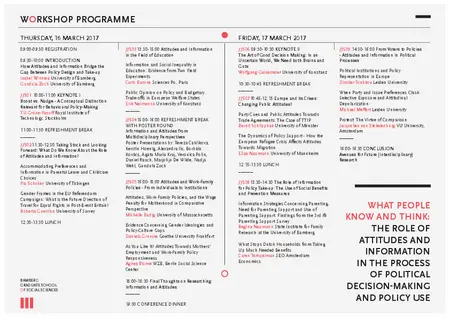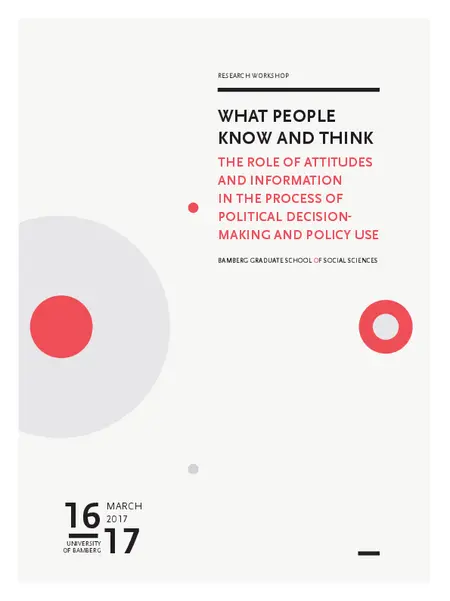RESEARCH WORKSHOP ▼
WHAT PEOPLE KNOW AND THINK:
The Role of Attitudes and Information in the Process of Political Decision-Making and Policy Use
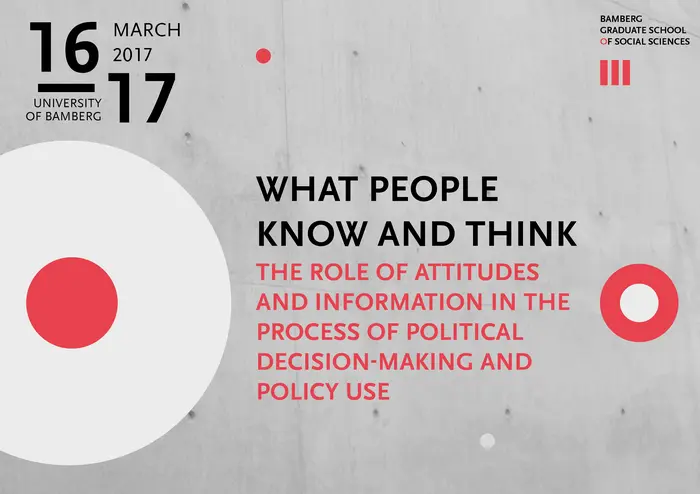
// INTER-DISCIPLINARY CONCEPT
? What impacts individual use of social policies? And how are policies decided upon in the first place? Which role do attitudes and information of population and policy makers play?
Over the past decades, many European countries have increasingly invested in social policies to facilitate the combination of employment and family. However, previous social science research has on the one hand focused on the structural and institutional level of policy-making, comparing policy decisions over time and across countries to decipher patterns, similarities or differences. On the other hand, studies have predominantly investigated whether changes in social policy have reduced social inequalities and social stratification. However, less is known about the role of attitudes and information when it comes to political decision-making and use of implemented social policies.
_______ To-date, the influence of attitudes and information on the use of policies such as family policies, education policies, welfare policies is well assumed. However, only few studies provide empirical evidence on how individual attitudes as well as relevant information on availability or access conditions may moderate the individual use of policies. Moreover, only few studies have investigated whether and through which channels policy legislation may also alter social attitudes and norms in the short-term. Against the well documented background of socio-economic disparities in use as well as the heterogeneous impact of social policies, this rather comes as a surprise.
_______ There is an equally important research gap with regard to the role of information and attitudes in the process of political decision making itself. Yet, it can be assumed that attitudes and the availability of information have a significant impact on actors and decision-making processes. Again, there is not much research on how attitudes of population and political actors, as well as information through media and other channels, might affect party and government positions on social policy. Little is known especially about how this influences actors’ subsequent strategies in policy-making processes. Social policy has long been a key concern for national governments, and is increasingly important to policy-makers in the European Union. However, research has not sufficiently explored how attitudes and affect policy-makers positions and strategies and alter the European process of social policy-making.
_______ We wish to connect researchers of different disciplines and methodological backgrounds in a workshop to discuss these questions and see how we can jointly improve research: on the importance of attitudes and available information in the context of access and use of social policies as well as the decision-making process of such policies on the national and European level. Our workshop aims to encourage a debate about where research stands, what current theoretical frameworks as well as methods can and cannot achieve and where our research should head. ?
........................................................................................................................................................
// GUESTS AND PARTICIPANTS
PRESENTATIONS & DISCUSSIONS
Prof. Dr. Carlo Barone, Sciences Po, Paris - Sociology
Dr. Agnes Blome, WZB, Berlin Social Science Center - Political Science
Prof. Dr. Sandra Buchholz, Bamberg University - Sociology
Prof. Michelle J. Budig, PhD, University of Massachusetts - Sociology
Prof. Dr. Wolfgang Gaissmaier, University of Konstanz - Psychology
Prof. Roberta Guerrina, PhD, University of Surrey - Political Science
Prof. Dr. Daniela Grunow, Goethe University Frankfurt - Sociology
Prof. Dr. Till Grüne-Yanoff, Royal Institute of Technology, Stockholm - Philosophy
Dr. Michael F. Meffert, Leiden University - Political Science
Dr. Elias Naumann, University of Mannheim - Sociology
Dipl.-Volksw. Erik Neimanns, University of Konstanz - Economics
Dipl.-Soz. Regina Neumann, State Institute for Family Research, University of Bamberg - Sociology
Prof. Dr. Bernd Schlipphak, University of Muenster (WWU)) - Political Science
Prof. Pia S. Schober, Ph.D., University of Tübingen - Sociology
Prof. Dr. Jacquelien van Stekelenburg, VU University, Amsterdam - Sociology
Dr. Caren Tempelman, Amsterdam Economics - Economics
Prof. Dr. Dimiter Toshkov, Leiden University
POSTER PRESENTATION BY:
Tereza Cahlikova, University of Lausanne
Marjolijn De Wilde, University of Antwerp
Kerstin Hoenig, LIfBi, University of Bamberg
Alexandra Ils, Goethe University Frankfurt
Borbála Kovács, Central European University
Agata Maria Kraj, University of Bamberg
Veronica Polin, University of Verona
Daniel Rasch, Ruhr-University Bochum
Nadja Wehl, University of Bamberg
Gundula Zoch, University of Bamberg
........................................................................................................................................................
// WORKSHOP PROGRAMME
Download the full programme booklet here(109.9 KB, 35 pages).
........................................................................................................................................................
// HOSTS AND ORGANIZERS
ISABEL WINNWA
University of Bamberg,
Doctoral Fellow at the Bamberg Graduate School of Social Sciences,
Political Science
Her research interests include the role of actors in EU decision-making processes, focusing on Council of Ministers and European Parliament, comparing the Justice and Home Affairs and Social Policy areas. In her doctoral project, she investigates the key role of actors and their strategies in legislative negotiations in intra- and interinstitutional decision-making processes.
www.uni-bamberg.de/bagss/isabel-winnwa
isabel.winnwa(at)uni-bamberg.de
GUNDULA ZOCH
University of Bamberg,
Doctoral Fellow at the Bamberg Graduate School of Social Sciences,
Sociology
Her research interests include social and gender inequalities in labour market participation and family processes and how social policies impact social stratification over the life course. In her doctoral project, she investigates whether the recent expansion of childcare services in Germany has altered parents’ gender role attitudes as well as maternal employment participation.
www.uni-bamberg.de/bagss/gundula-zoch
gundula.zoch(at)uni-bamberg.de
........................................................................................................................................................
// THE INTERVIEW SERIES & IMPRESSIONS
We asked the follwing interview question to the workshop participants to have a first glance at their background and perspectives they bring to the workshop. Along with the answers we give you some visual impressions of the event.
Which role do attitudes and information play in your scientific work/research?
Isabel Winnwa: I think both concepts play an important role in my research on negotiation dynamics in the European Union. The attitudes of policy-makers shape their perception of the issues they discuss and steer negotiations in a certain direction. The availability or lack of information about the issues, and interestingly also about the attitudes of others towards the issue, have a similar impact on negotiation dynamics. After all, policy-makers are humans, their decision-making performances are based on their capabilities, both emotional and cognitive. This makes European policy-making a complex process of actors debating perceptions and attitudes within a context of limited information. My intent is to disentangle these dynamics and understand how the multitude of individual perspectives is merged into a coherent, mutually acceptable policy decision.
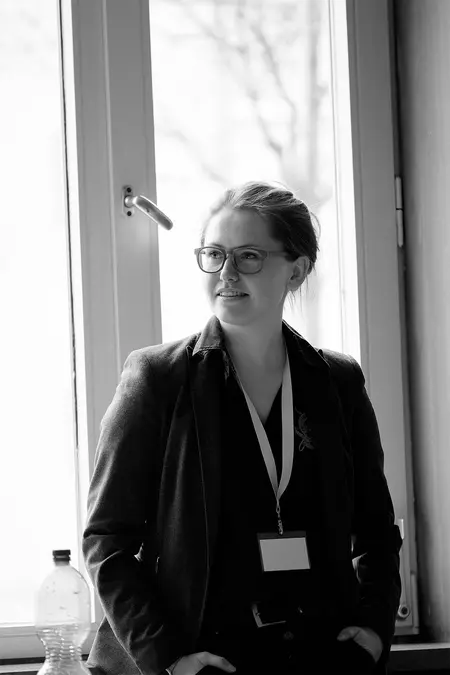
Gundula Zoch: My research focuses on the impact of social policy interventions on social inequalities across the life course. Both attitudes and information play an important role as they influence access, use and hence the outcomes of various policies. For example, parental employment decisions and take-up of family policies such as parental leave or formal childcare depends on parents’ work-care preferences and information on available policy support as well as relevant access conditions. At the same time, policy take-up itself might induce individual attitude change over the life-course. Therefore, available information as well as individual attitudes seem to play a crucial role to understand the impact of social policy interventions on socio-economic inequalities.
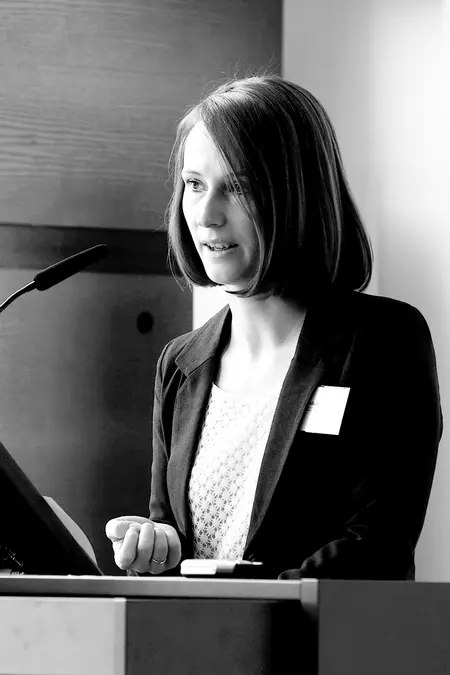
Till Grüne-Yanoff: I am interested in how preferences and other motivational attitudes are modeled in the social sciences. In particular, I investigate how one can model preference change, both as a descriptively accurate as well as a normatively valid model. I am also interested in how preferences can be the basis for normative judgments about a person’s (or a group’s) well-being, when these preferences are not fully rationally formed or contain mistakes from flawed reasoning or biased deliberation. This might open up an opportunity for policy intervention and it raises interesting questions about how well-being (in this case as the objective of the policy intervention) can then be determined.
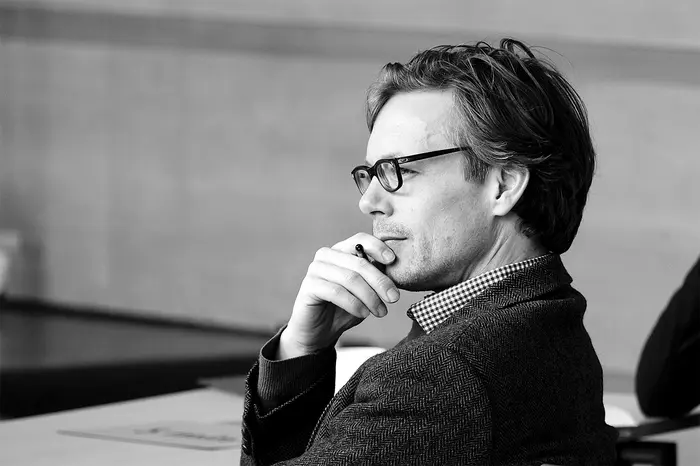
Pia Schober: In my research field of family sociology, it is widely recognised that attitudes, for instance towards parental careers and childcare arrangements, vary considerably between different population groups within and across countries. By contrast, differences in levels of knowledge or information have received less attention und are frequently ignored in the theoretical and empirical analysis. Even though there are still many open questions regarding social change in attitudes and interdependence with institutions, in my view the research gap is even greater with respect to the roles which knowledge and information transmission play for the choices individuals make over the life course.
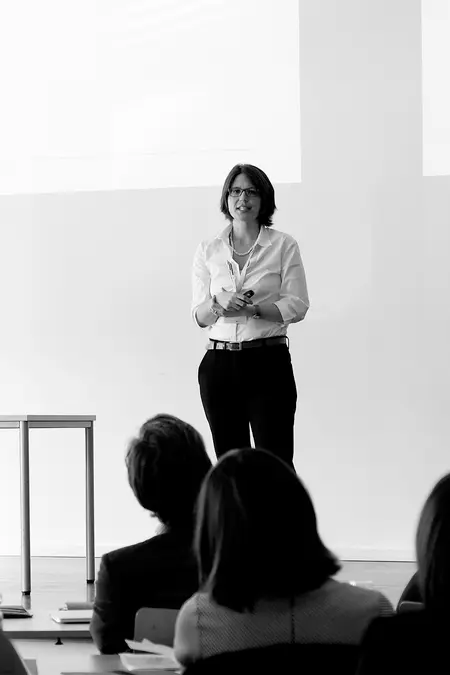
I make information experiments where I try to correct information biases to assess their effects on educational inequalities.
_ Carlo Barone
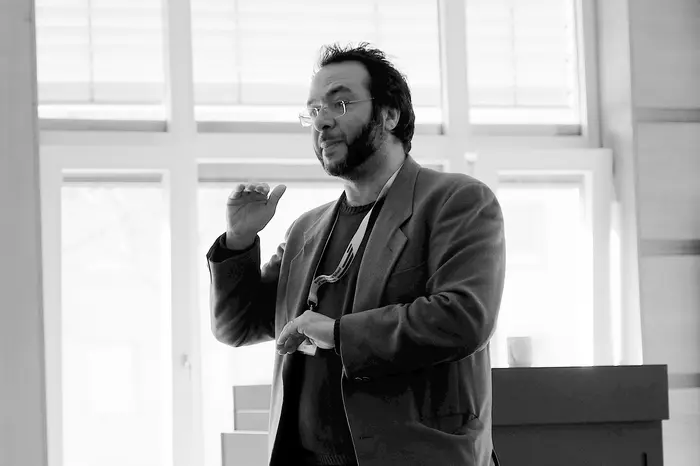
Dimiter Toshkov: In my research, I study the impact of public attitudes and opinions on policy making. I grapple with questions such as ‘Are the wishes of the public reflected in public policies?’, ‘When do the citizens get the policies that they want?’, and ‘What is the role of political parties in this process?’ Clearly, these are rather fundamental questions for evaluating and understanding democratic politics, and they are difficult to answer. First, we don’t have systematic, fine-grained and reliable measures of the policy-relevant attitudes of citizens nor of the state of public policies. A big part of my work goes into identifying relevant data sources and constructing new measures of these phenomena. Second, even with perfect data, it is very hard to disentangle the causal impact of public opinion on policy from other potentially important forces, such as interest group influence, party preferences, or changing socio-economic conditions. To address this challenge, I employ a variety of research designs and approaches ranging from time-series statistical analyses to process-tracing case studies. As the impact of public attitudes on public policy is rarely direct, I also study how it is being moderated by political institutions and patterns of party government.
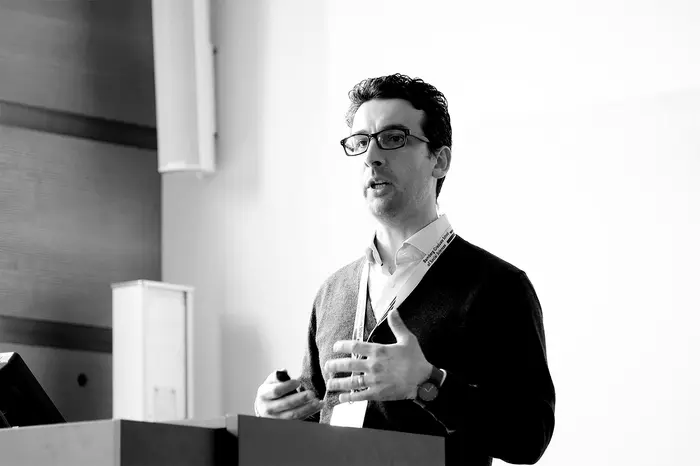
Michael F. Meffert: Information is the currency of politics, determining influence and power. In my research, I try to understand how individual citizens perceive politics, form expectations and attitudes, and make their decisions by investigating the interplay of external or contextual information sources, internal predispositions, and situational processing goals. External messages from institutions, social groups, media, and personal networks prime and activate individual predispositions such as core beliefs, social identities, and other existing cognitions and affective reactions. The immediate processing goal, basically ‘accuracy’ or ‘defense’, along with a more or less automatic reliance on heuristics, then determines how they shape the attitudinal outcomes.
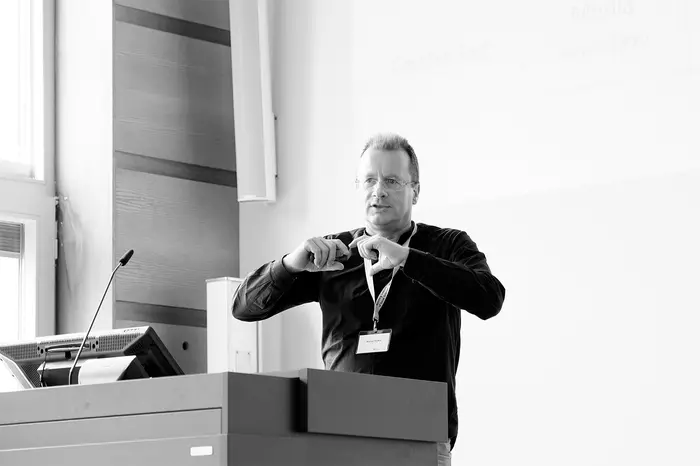
Erik Neimanns: On the one hand, I am interested in the macro- and micro-level determinants of attitudes towards education and social policies to figure out which social groups in which institutional contexts support and oppose policy reforms. This sheds light on potential cleavages within the public and on the potential for coalition formation between different social groups. On the other hand, knowing public attitudes can help in evaluating the degree of governments’ responsiveness towards the public in education and social policy making. I aim to identify under which circumstances reforms cater to the median voter, specific partisan constituencies, or not at all to public demands.
Tereza Cahlikova: The attitudes and perceptions of public officials and politicians seem to play the decisive role in the process of public sector digitalisation in Switzerland. Lack of political support is at present a deal-breaker for initiatives falling under the scope of e-Participation and e-Democracy. Positive attitudes to digital initiatives seem to be connected, on the one hand, to education and professional background and, on the other, to personal ambition of particular actors that wish to profile themselves as ? pioneers ? in the field. The facilitation of access to public services and decision-making for citizens comes only as a secondary argument. It is likely that a change in paradigm is necessary in order to introduce e-Democracy and e-Participation in a more coherent and efficient way. In the framework of my research, the questions related to attitudes that are to be answered are two-fold: What are the best possible ways to measure and analyse attitudes and how are the latter formed.
My research focuses on the impact of social capital in education. Access to information through socialties is one of the key elements of social capital, and I am interested in the impact this information has on actors’ educational decisions.
_ Kerstin Hoenig
Daniel Rasch: I recently finished my Phd on the role and effects of information and frames for decision-making in the European Union. More precisely, the effects of information and frames used by lobbyists to convince European decision-makers to adopt the lobbyists’ goals into policies. I am currently working on a book with Routledge that will cover this aspect. I haven’t work with attitudes so far but I am planning to start a bigger research project on information, frames and attitudes in regard to the recent challenges to security policy and how it is communicated between society and political leaders in different countries.
Agnes Blome: In my research, we look at people’s attitudes as one factor influencing policy-making. In other words, in contrast to studies that find that attitudes change as a consequence of new policies, we assume that policy-makers respond to (changed) attitudes in the population.
Bernd Schlipphak: Mostly, I have been, and still am, interested in the effect of elite communication on citizens’ attitudes. Currently, I focus on the interface between international and domestic politics in this regard – how do elites frame international / global politics in order to sustain or gain domestic support for their policies? More specifically, I am analyzing whether and how governing / populist elites are able to threaten citizens into becoming more conservative and into supporting authoritarian policies by referring to threats from beyond the nation state. To fully explain what is going on, I combine elite cueing approaches from political communication with social psychology research on the effects of threat and risk perception.
Elias Naumann: Attitudes - i.e. policy preferences and in particular support for the welfare state but also social preferences more general like altruism, reciprocity or inequality aversion - are the main focus of my research. Do social groups have different attitudes? How do socio-economic developments shape individual attitudes and how can we explain individual attitude change? In the process of attitude formation and change, information on these socio-economic developments and how they are framed play a crucial role.
Regina Neumann: In my research, the overarching question is how parenting support offers and projects can be designed in a manner that corresponds best to parents’ needs. For this purpose, I collected data about parents’ attitudes towards parenthood, information strategies and preferences concerning family life and parenting to enable parenting support providers to adjust their offers and projects correspondingly. Furthermore, my research is about parents’ preferences concerning family support offers and the specific use of parenting support offers.
Caren Tempelman: My research often focusses on individuals. Attitudes and information play an important role as they influence individual behaviour. For example, the effect of labour market policies highly depends on a persons’ motivation and take up of benefits is conditional on people knowing allowances exist.
........................................................................................................................................................
// THE SCENERY

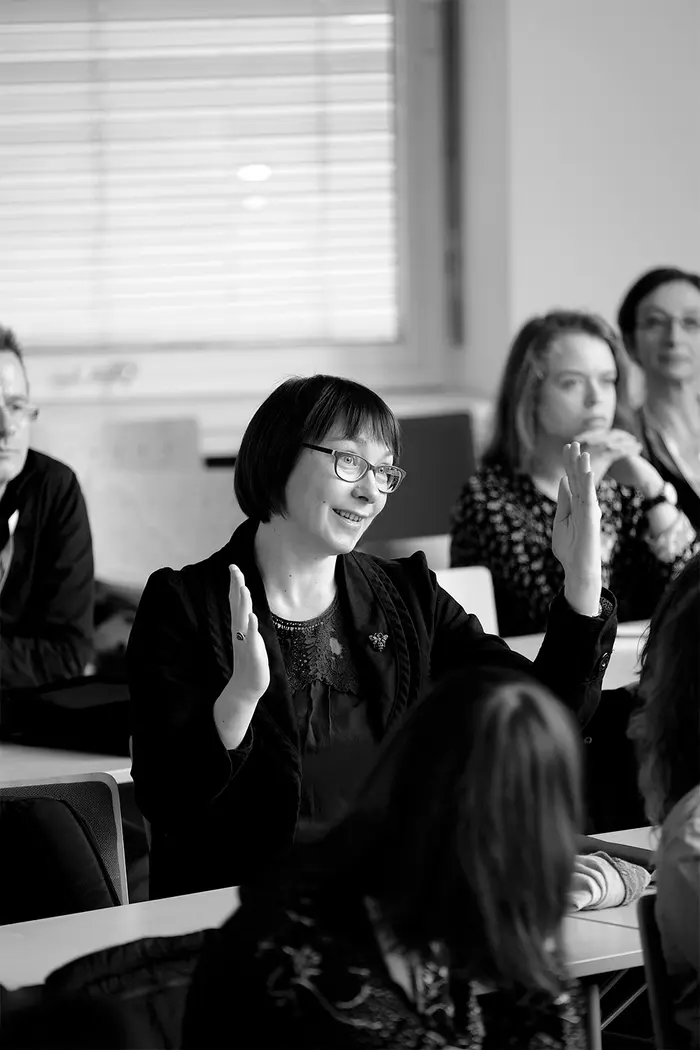
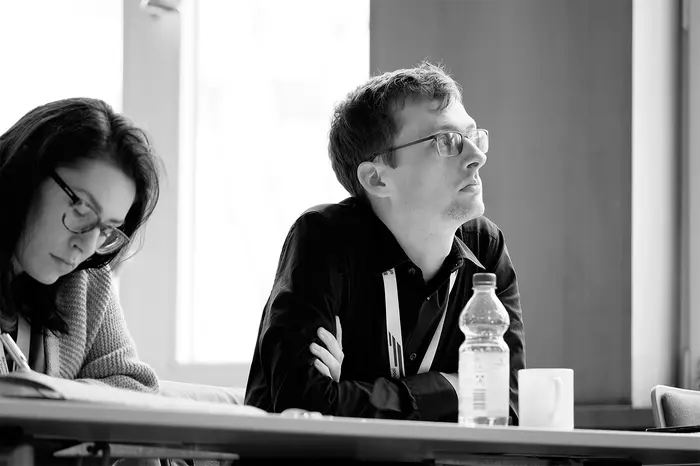
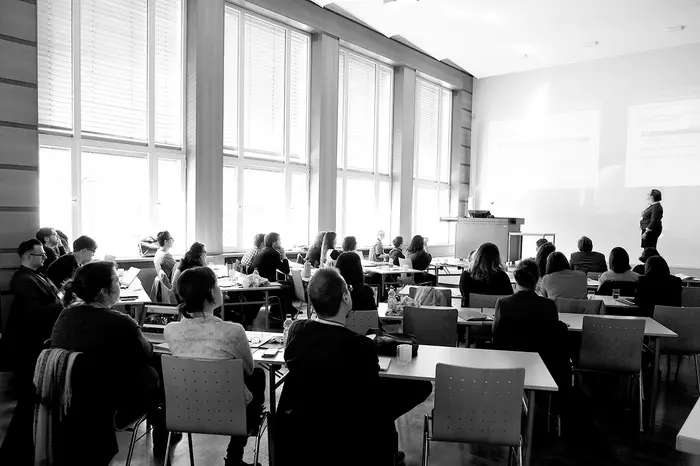
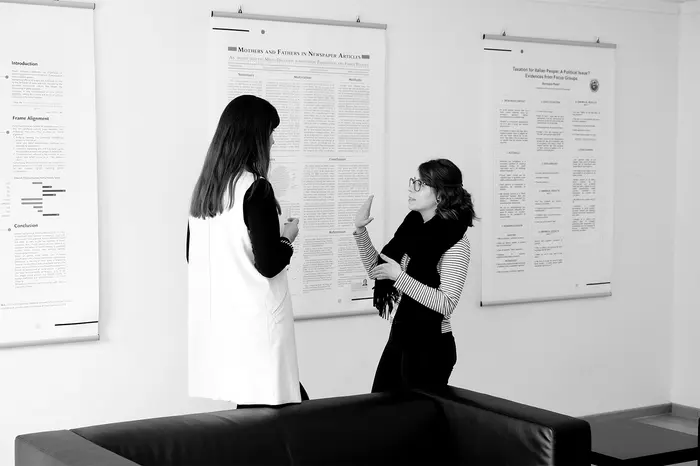
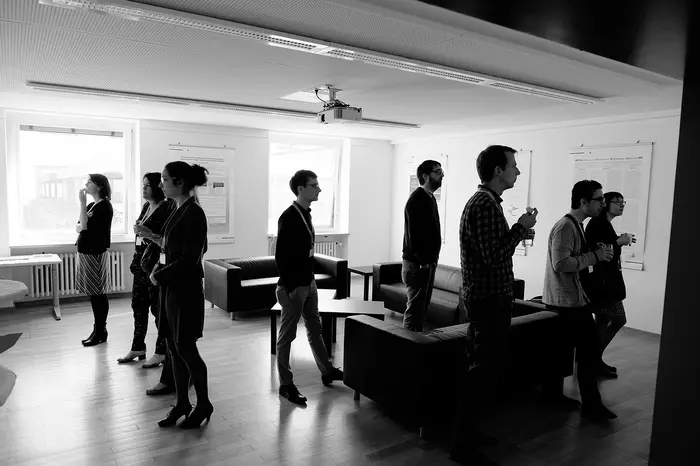
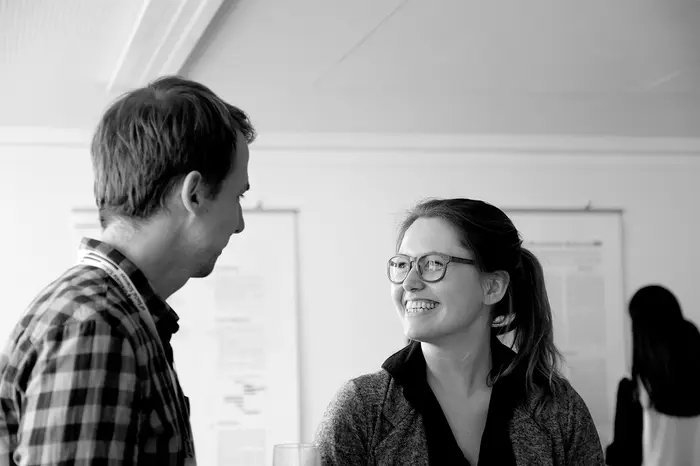
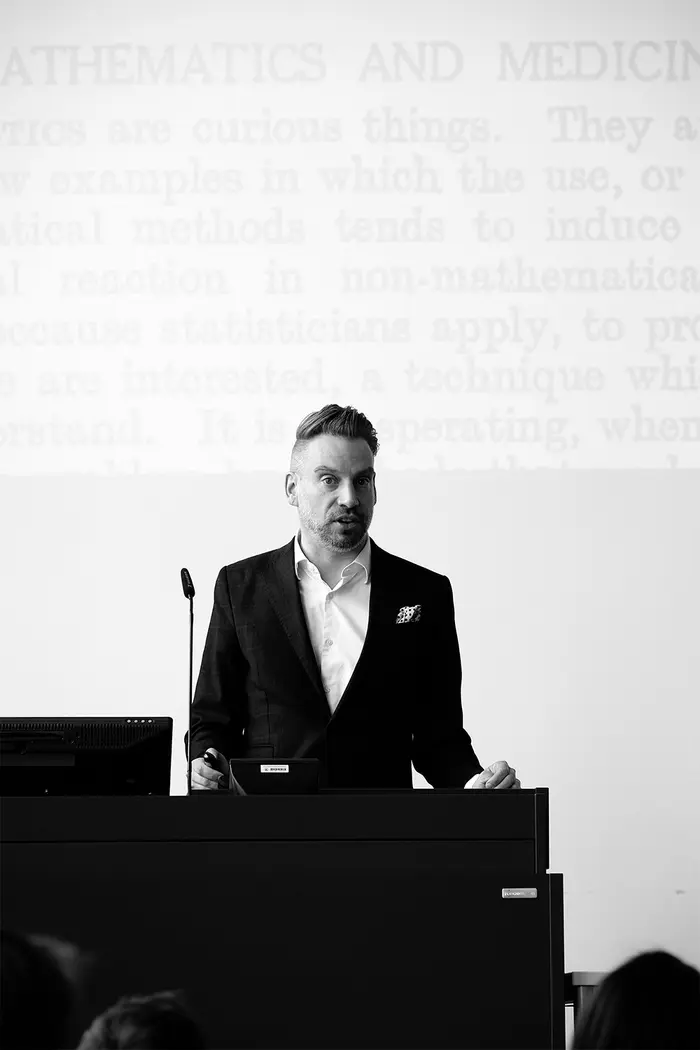
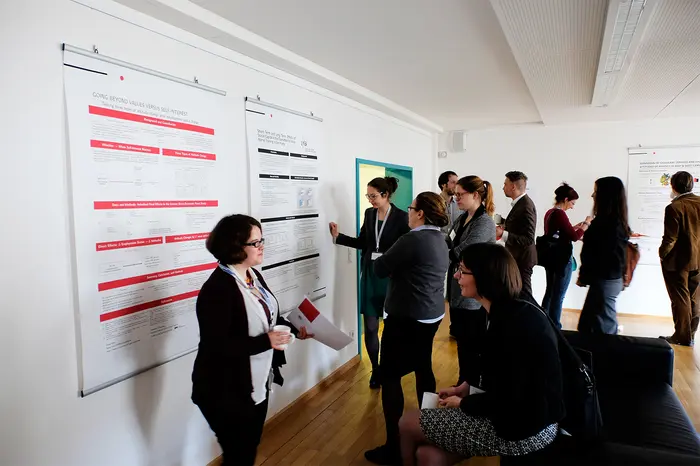


........................................................................................................................................................
MAIN PAGE | CONTACT | LEGAL | PRIVACY POLICY | DATENSCHUTZ | IMPRESSUM
? Bamberg Graduate School of Social Sciences
Image Credits: ? Bamberg Graduate School of Social Sciences
